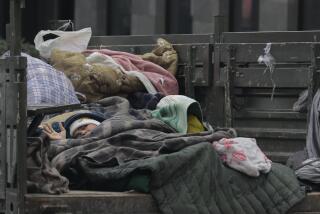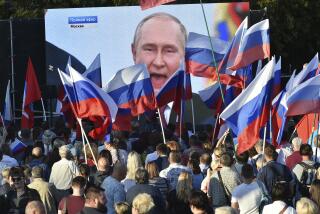Russia Rising to Supplant Soviet Union as Big Power : Breakup: Leaders of federation are grabbing Kremlin reins. “This is not temporary,” says a Yeltsin aide.
- Share via
MOSCOW — With the Soviet Union spinning apart faster and faster, a new power is rising to take its place: Great Russia.
“With all confidence in the central government lost, the center has moved to Russia,” Lev Sukhanov, an aide to Russian Federation President Boris N. Yeltsin, said Monday. “This is not temporary.”
Russia, the vast federation spreading across 11 time zones from the Baltic Sea in the northwest to the Pacific Ocean in the east, is only one of 15 Soviet republics. But it is home to more than half the Soviet population--about 150 million people--and more than two-thirds of the country’s territory.
More important, given the stormy dynamics of Soviet politics, the Russian Federation leadership--which so heroically defended democracy against last week’s coup attempt--now claims the right to take over any part of the central government it deems necessary.
“I support fully that the Russian leadership is taking power into its hands in this extreme situation,” Soviet Environment Minister Nikolai N. Vorontsov said Monday. “These are real men.”
Beginning a week ago, Yeltsin has issued a flurry of decrees. Some of them, like his declaration that he was commander in chief of all troops on Russian soil, were prompted by the crisis. But others clearly were aimed at taking the reins of the country for much longer.
Yeltsin transferred the national Economics Ministry lock, stock and barrel into Russian jurisdiction, as well as a ministry that handles supplies of raw materials. He topped off the decrees with sops to fired employees, saying that new jobs will be found for them. He also appropriated all special Soviet government telephones--to help keep in touch in case there is another coup--and took all Soviet communications, including phones, satellites and the associated technology, under Russian control.
After members of the Soviet Cabinet supported the putsch, Yeltsin decreed that the ministers’ powers were automatically transferred to the Russian government. He has since appointed four of his own men, headed by Russian Federation Prime Minister Ivan S. Silayev, to handle the economy for an unspecified duration.
Soviet President Mikhail S. Gorbachev, once Yeltsin’s fierce rival, has made not a peep about the power shift. These days, said Soviet lawmaker Yuri Andreyev, “I wouldn’t be surprised if every working day President Gorbachev starts with a call to Yeltsin to say, ‘What plans do we have today, Boris Nikolayevich?’ ”
Russia has clearly been filling a perilous vacuum of power since Gorbachev was detained in the Crimea and then came back demoralized. But lawmakers and leaders said Monday that this impromptu arrangement would also likely translate into the shape of the future Soviet Union.
“A strong Russia is better for the republics than a strong central government was,” said Armenian President Levon Ter-Petrosyan, who is proposing that Russia take over the Soviet army, KGB secret police and Interior Ministry. “We see Russia as a democratic republic.”
Further, because Russia has no claims over other republics, if it does anything against them, they can appeal to the force of international law--something they could not do when they were part of the Soviet Union, he added. In that situation, other nations would have been loathe to interfere with Soviet internal matters.
Even Leonid Sanduliak, a Ukrainian deputy whose republic declared independence Saturday, allowed: “It is fine if Russia is strong, so long as it does not use its strength to create a new empire.”
Historically, Russia was, indeed, an empire builder. It expanded its territory from the modest realm ruled by the early czars to a sprawling conglomerate of Slavs, Central Asian Muslims, Siberian Eskimos and more than 100 other peoples occupying nearly one-sixth the world’s landmass by the beginning of the 20th Century.
Even now, the Russian Federation shows the legacy of its history: It is riven by strivings for autonomy by its own 31 republics and regions, and has, thus far, proven unable to find a lasting formula for harmony.
And while relations among the Soviet republics are now so fluid that there is euphoria about Russia’s conduct today, by tomorrow, there could easily be another round of conflict and accusations of Russian imperialism. Chances are that, if Russia pursues its role as the leading republic, dissenters both from within and from other republics who feel threatened by Russia’s ambitions will find their voices.
Indeed, there were hints of friction already Monday, when Russia told other Soviet republics that it would not let them secede, taking large Russian-inhabited areas with them, and the leader of neighboring Kazakhstan suggested that armed border disputes could touch off an inter-republic war.
A statement issued in President Yeltsin’s name said the Russian Federation reserved the right to review its borders with any adjacent republic that left the union.
But Kazakh leader Nursultan Nazarbayev told the Interfax news agency that Russian insistence on the issue could unleash conflicts between the republics.
“The president of Kazakhstan expressed the danger of the possibility of an inter-republic war emerging if Russia raised the issue of re-examining borders,” Interfax said.
Russian officials, however, are trying to reassure other republics that Russia is not setting itself up as the imperial center.
“Russia has no pretensions toward dominance in the union,” Yeltsin aide Sergei Stankevich said. “I think concerns about the new role of Russia were provoked by some actions by Yeltsin during the critical time, but it is not his long-term program.”
In the meantime, negotiations continue on a new treaty affecting the whole of the Soviet Union. But with the whirlwind of change sweeping Soviet politics, it is no longer clear what shape the agreement will take or even how many republics will join.
One probability, according to radical economist Grigory Yavlinsky, a member of Silayev’s committee on the economy, is that Russia will “take over the instruments of power of the central government” and let all the other republics choose whether they want to remain part of a new, looser union forming around Russia.
“Russia should be prepared to be self-sufficient as a state,” Stankevich said, hinting that it may choose that route.
Ruslan Khasbulatov, chairman of the Russian Parliament, explained that “the idea is to let those republics who want to live independently try it--then many of them will come back” to Russia.
Yavlinsky said there are constant consultations under way among Gorbachev, Yeltsin and the other republics as they try to decide what new form the country--if it will still be a country--will take.
Even if the union breaks up into a loose confederation, however, deputies said that Russia will naturally dominate. “That’s how it should be,” Andreyev said. “Russia has 80% of the industry, 70% of the military-industrial complex. . . . It’s a giant that supports the economy of the other republics.”
And with its size, Stankevich acknowledged, come Russia’s special responsibilities.
During whatever transition period lies ahead, Russia should take responsibility for nuclear weapons, he said, simply because most of them are on its territory.
Sanduliak said the Ukraine has no objection to Russia ending up as the only nuclear power, and he predicted that other republics would also agree.
According to Ter-Petrosyan, Armenia would be willing to allow Russia to keep military bases on its territory because the Armenians consider that those limited bases would be far less dangerous than having the Kremlin actively interfere in internal conflicts--as it has in the past.
More to Read
Sign up for Essential California
The most important California stories and recommendations in your inbox every morning.
You may occasionally receive promotional content from the Los Angeles Times.













